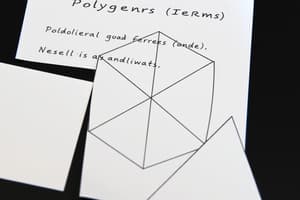Podcast
Questions and Answers
What is Chapter 6?
What is Chapter 6?
Geometry content.
Two polygons are similar if:
Two polygons are similar if:
- Corresponding sides are congruent (correct)
- Corresponding angles are equal
- Corresponding sides are equal
- Corresponding angles are congruent (correct)
What is reflection in geometry?
What is reflection in geometry?
Creates a mirror image by reflecting a figure over something.
What is rotation?
What is rotation?
What is translation?
What is translation?
Which are ways to prove triangles similar?
Which are ways to prove triangles similar?
What is the 45-45-90 theorem?
What is the 45-45-90 theorem?
What is the 30-60-90 theorem?
What is the 30-60-90 theorem?
When do you use inverse trigonometry (sin-1)?
When do you use inverse trigonometry (sin-1)?
What are the interior angles of a quadrilateral?
What are the interior angles of a quadrilateral?
How do you find the angle sum in a polygon?
How do you find the angle sum in a polygon?
What does the Polygon Exterior Angles Theorem state?
What does the Polygon Exterior Angles Theorem state?
What is a parallelogram?
What is a parallelogram?
What is a rhombus?
What is a rhombus?
What is a rectangle?
What is a rectangle?
What is a square?
What is a square?
What is a trapezoid?
What is a trapezoid?
When is a trapezoid considered isosceles?
When is a trapezoid considered isosceles?
What is the midsegment on a trapezoid?
What is the midsegment on a trapezoid?
What are tangent circles?
What are tangent circles?
What are concentric circles?
What are concentric circles?
What is the standard equation of a circle?
What is the standard equation of a circle?
How can you describe a translation?
How can you describe a translation?
What is the component form of a vector?
What is the component form of a vector?
What is the reflection in the x-axis?
What is the reflection in the x-axis?
What is the reflection in the y-axis?
What is the reflection in the y-axis?
What is the result of reflecting a point in the line y=x?
What is the result of reflecting a point in the line y=x?
How is a point reflected in the line y=-x?
How is a point reflected in the line y=-x?
What are the coordinates after rotating a point 90 degrees?
What are the coordinates after rotating a point 90 degrees?
What happens when you rotate a point 180 degrees?
What happens when you rotate a point 180 degrees?
What happens when you rotate a point 270 degrees?
What happens when you rotate a point 270 degrees?
What does the Reflections in Intersecting Lines Theorem state?
What does the Reflections in Intersecting Lines Theorem state?
What is the circumference of a circle?
What is the circumference of a circle?
What is the formula for arc length?
What is the formula for arc length?
What is the area of a circle?
What is the area of a circle?
What is the area of a sector?
What is the area of a sector?
How do you calculate the probability a point is on an area of a line?
How do you calculate the probability a point is on an area of a line?
What is the area of a right cone?
What is the area of a right cone?
What is the area of a cylinder?
What is the area of a cylinder?
What is the area of a sphere?
What is the area of a sphere?
What is the area of a trapezoid?
What is the area of a trapezoid?
What is the volume of a cylinder?
What is the volume of a cylinder?
What is the volume of a solid?
What is the volume of a solid?
What is the volume of a cone?
What is the volume of a cone?
What is the volume of a pyramid?
What is the volume of a pyramid?
What is the volume of a sphere?
What is the volume of a sphere?
What does Euler's Theorem state?
What does Euler's Theorem state?
What is a chord?
What is a chord?
What is a secant?
What is a secant?
What is a tangent?
What is a tangent?
What is a central angle?
What is a central angle?
What is the difference between minor arc and major arc?
What is the difference between minor arc and major arc?
What are adjacent arcs?
What are adjacent arcs?
What is an inscribed angle?
What is an inscribed angle?
Flashcards are hidden until you start studying
Study Notes
Chapter 6: Basic Transformations and Similarity
- Similar polygons have congruent corresponding angles and proportional corresponding sides.
- Reflection creates a mirror image across a line or axis.
- Rotation involves turning a figure around a specific point.
- Translation refers to sliding a figure in any direction without altering its shape.
Chapter 7: Triangle Similarity
- Triangles can be proven similar using:
- AA (Angle-Angle) postulate
- SSS (Side-Side-Side) similarity
- SAS (Side-Angle-Side) similarity.
- The 45-45-90 theorem relates the lengths of the legs to the hypotenuse: hypotenuse = leg * √2.
- In a 30-60-90 triangle, the relationships are:
- Hypotenuse = 2 × shorter leg
- Longer leg = shorter leg × √3.
Chapter 8: Angles in Polygons
- The sum of interior angles in a quadrilateral is 360 degrees.
- To find the angle sum of any polygon, use the formula: (sides - 2) * 180.
- According to the Polygon Exterior Angles Theorem, the sum of exterior angles of any polygon equals 360 degrees.
Quadrilaterals Characteristics
- A parallelogram has opposite sides that are equal and parallel, with bisecting diagonals and congruent opposite angles.
- A rhombus is a type of parallelogram with four equal sides and perpendicular diagonals.
- A rectangle is a parallelogram with four right angles.
- A square is a special parallelogram that has both four right angles and four congruent sides.
- A trapezoid features one pair of parallel sides known as bases.
- An isosceles trapezoid has congruent base angles and equal diagonals.
Chapter 9 and 10: Circles and their Properties
- Tangent circles touch at exactly one point.
- Concentric circles share the same center but have different radii.
- The standard equation of a circle with center (h, k) and radius r is given by: (x - h)² + (y - k)² = r².
Transformations and Vectors
- A translation can be described by the notation: (x,y) → (x+a, y+b).
- The component form of a vector consists of its horizontal and vertical movements.
- Reflection in the x-axis transforms a point (x, y) to (x, -y).
- Reflection in the y-axis transforms a point (x, y) to (-x, y).
- Reflection in the line y = x changes a point (b, a) to (b, a).
- Rotation transformations involve:
- 90 degrees: (-b, a)
- 180 degrees: (-a, -b)
- 270 degrees: (b, -a).
Chapter 11: Measurement of Circles and Solids
- The circumference of a circle can be calculated using either 2πr or πd.
- Arc length determination uses the ratio: Length/2πr = Measure/360.
- The area of a circle can be found using the formula: πr².
- The area of a sector of a circle follows: Area/πr² = Measure/360.
Areas and Volumes of Solids
- The area of a right cone includes the base area (πr²) plus the lateral area (πrl).
- The area of a cylinder combines the base areas and lateral surface area: 2πr² + 2πrh.
- The surface area of a sphere is calculated as 4πr².
- The area of a trapezoid is given by: 1/2h(b1+b2).
- Volume calculations are characterized by:
- Cylinder: πr²h
- Cone: 1/3πr²h
- Pyramid: 1/3Bh
- Sphere: 4/3πr³.
Euler's Theorem and Circle Terminology
- Euler's Theorem states the relation: V + F = E + 2, where V is vertices, F is faces, and E is edges.
- A chord is a segment with endpoints on the circle.
- A secant is a line that intersects a circle at two points.
- A tangent touches a circle at exactly one point.
- A central angle has its vertex at the circle's center.
- Minor and major arcs are segments of a circle, defined by their angles.
- Adjacent arcs are arcs that intersect at a single point.
- An inscribed angle is formed by two chords from the circle.
Coordinate Geometry
- The distance formula calculates the distance between two points in the coordinate plane.
- The midpoint formula determines the midpoint between two endpoints on a line segment.
- The slope is defined as the ratio of the rise over the run between two points on a line.
Studying That Suits You
Use AI to generate personalized quizzes and flashcards to suit your learning preferences.




